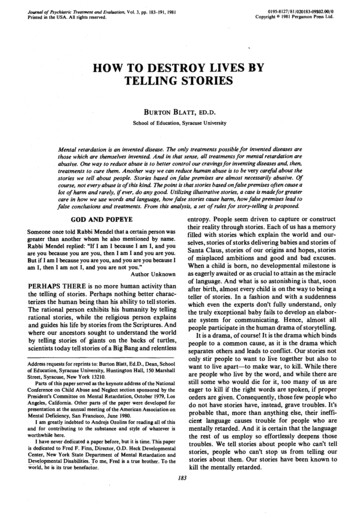
Transcription
0195-8127/ 81/020183-09S02.00/ 0Copyright 1981 Pergamon Press Ltd.Journal of Psychiatric Treatment and Evaluation, Vol. 3, pp. 183-191, 1981Printed in the USA. All rights reserved.HOW TO DESTROY LIVES BYTELLING STORIESBURTON BLATT, ED.D.School of Education, Syracuse UniversityMental retardation is an invented disease. The only treatments possible for invented diseases arethose which are themselves invented. And in that sense, all treatments for mental retardation areabusive. One way to reduce abuse is to better control our cravings forinventing diseases and,then,treatments to cure them. Another way we can reduce human abuse is to be very careful about thestories we tell about people. Stories based on false premises are almost necessarily abusive. Ofcourse, not every abuse is of this kind. The point is that stories based on false premises often cause alot of harm and rarely, if ever, do any good. Utilizing illustrative stories, a case is made for greatercare in how we use words and language, how false stories cause harm, how false premises lead tofalse conclusions and treatments. From this analysis, a set of rules for story-telling is proposed.entropy. People seem driven to capture or constructtheir reality through stories. Each of us has a memoryfilled with stories which explain the world and our selves, stories of storks delivering babies and stories ofSanta Claus, stories of our origins and hopes, storiesof misplaced ambitions and good and bad excuses.When a child is born, no developmental milestone isas eagerly awaited or as crucial toattain as the miracleof language. And what is so astonishing is that, soonafter birth, almost every child is on the way to beingateller of stories. In a fashion and with a suddennesswhich even the experts don't fully understand, onlythe truly exceptional baby fails to develop an elabor ate system for communicating. Hence, almost allpeople participate in the human drama of storytelling.It is a drama, of course!It is the drama which bindspeople to a common cause, as it is the drama whichseparates others and leads to conflict. Our stories notonly stir people to want to live together but also towant to live apart—to make war, to kill. While thereare people who live by the word, and while there arestill some who would die for it, too many of us areeager to kill if the right words are spoken, if properorders are given. Consequently, thosefew people whodo not have stories have, instead, grave troubles. It'sprobable that, more than anything else, their ineffi cient language causes trouble for people who arementally retarded. And it is certain that the languagethe rest of us employ so effortlessly deepens thosetroubles. We tell stories about people who can't tellstories, people who can't stop us from telling ourstories about them. Our stories have been known tokill the mentally retarded.GOD AND POPEYESomeone once told Rabbi Mendel that a certain person wasgreater than another whom he also mentioned by name.Rabbi Mendel replied: "If I am I because I am I, and youare you because you are you, then I am I and you are you.But if I am I because you are you, and you are you because Iam I, then I am not I, and you are not you."Author UnknownPERHAPS THERE is no more human activity thanthe telling of stories. Perhaps nothing better charac terizes the human being than his ability to tell stories.The rational person exhibits his humanity by tellingrational stories, while the religious person explainsand guides his life by stories from the Scriptures. Andwhere our ancestors sought to understand the worldby telling stories of giants on the backs of turtles,scientists today tell stories of a Big Bang and relentlessAddress requests for reprints to: Burton Blatt,Ed.D., Dean, Schoolof Education, Syracuse University, Huntington Hall, ISO MarshallStreet, Syracuse, New York 13210.Parts of this paper served asthe keynoteaddress of the NationalConference on Child Abuse and Neglect section sponsored by thePresident's Committee on Mental Retardation, October 1979, LosAngeles, California. Other parts of the paper were developed forpresentation at the annual meeting of the American AssociationonMental Deficiency, San Francisco, June 1980.I am greatly indebted to Andrejs Ozolins for reading all of thisand for contributing to the substance and style of whatever isworthwhile here.I have never dedicated a paper before, but it is time. This paperis dedicated to Fred F. Finn, Director, O.D. Heck DevelopmentalCenter, New York State Department of Mental Retardation andDevelopmental Disabilities. To me, Fred is a true brother. To theworld, he is its true benefactor.183
184Because language has such power and importance,and because not to have it is to be in such serioustrouble, I want to spend some time thinking not somuch about retarded people as about the stories wetell, what kinds of consequences stories have, andwhat guidelines there might be to steer us through theinescapable dilemmas of human language and life.Because their inability to use language defines andcauses trouble for people who are mentally retarded,because we live in a world constructed of stories andthe mentally retarded cannot tell their own stories,and they cannot stop us from telling destructivestories about them, I want to concentrate here onstories as both antecedent to abuse as well as reflec tions of concern. In this way, I intend to build a casefor stories as the context in which to understand theharm we cause other people, even those whom weprofess to be our brothers.When God says, "I am," and when Popeye says, "Iam what I am," both are affirmations that everyone—that even God—has and tells stories which define us.When God says "I am," He warns us, of course, thatthere is nothing more to be said, that He is everything.But when the sailor says "I am what I am," he, too,announces that nothing more need be said—imperfections notwithstanding—that you can takehim or leave him, but if you take him, you must takethe total person, the coarseness as well as the goodnature, the spinach with the muscles. You can't haveone without the other. That's why, while "I am" is themost serious story, "I am what I am" is the mostserious individual's story. A person is defined by thestories he tells about himself as well as the stories thatare told about him. But sometimes, one's definitionsof oneself are challenged, and this signals the begin nings of abuse.Language is such a miracle! It begins with theinfant, who very soon after birth achieves a sophisti cated system for communicating. Language stirspeople to make love, to initiate wars, to lay their livesdown for their country, or their God, or their youth,or their excesses. Language drives away boredom,enriches our lives, makes life worth living. Languagealso hurts, may make one's life unbearable. Languagecan kill! Nothing is more certain than that there areinescapable consequences of language. That is, onecan rarely if ever say, "I'm sorry" and, thus, patchthings up as if nothing had occurred after announcingto a lover that the relationship had ended. One can'tsimply say, "I didn't mean it" and get away with itafter telling someone something for his "own good."One can't always say, "I made a mistake," afterdeclaring that so and so is mentally ill or he or she ismentally retarded. Writers live to produce language,others have died to rid themselves of mischievouslanguage. Is it any wonder that telling false storiesabout people can destroy their lives? Is it any wonderBurton Blatlthat the process of abuse is initiated at the inventionof a disease assigned to a person? By merely telling astory, the scene is set for abuse.Once upon a time, there was an old woman wholived alone in a very old house which had been herfather's as well as his father's house. Everyone in thetown said that she had a mattress full of money. Onenight while she slept, three young men stole into thehouse, killed the old woman and tore open themattress. They found old feathers.Once upon a time, an old man and an old womanlived together in the same house for sixty years. Whenthe old man died, the couple's children decided thatthe old woman couldn't take care of herself anylonger. She needed "care." They placed her in anursing home, although she didn't need "care" untilafter she was placed there.In the first of these stories, the intention was to doharm. In the other, good. But both stories about theseold people had evil consequences. Intentions aside,stories which are not true usually have evil conse quences. Abuse is to be expected from stories aboutmattresses filled with money. The most benign con sequence of such a story is that it is made false, thatthe thieves and murderers find out after invading herprivacy that the old woman doesn't have any moneyhidden in a mattress. The most benign consequence ofdoing something for someone's "good," in spite ofthat person's objections, is that the "busybody"doesn't get away with it. When Socrates said thatyou can't have good ends from bad means, he mustalso have meant that you can't do people good if youlie to them or about them, if you invent stories abouttheir lives.Centuries ago in this country, there were storiesabout women who were witches, women who castspells or who gave birth to calves. Such women werehanged, not because they broke any laws, not becausethey weren't church-going or honest, and not becausethey didn't watch over their families. The women werehanged because they were witches, and witches werehanged. That was surely not history's first example,but murdering witches illustrates what can occurwhen abuses are invented to deal with inventeddiseases. In many quarters, a "67" means "educablementally retarded," and stories are told about the"educable mentally retarded." And a "44" means"trainable mentally retarded," and stories are toldabout those people. In 1969, 200,000 people lived instate institutions for the mentally retarded, and one ofthe stories about virtually all of those people was thatthey were not able to take care of themselves out ofthe institution. And while there are fewer people insuch institutions today, that same story persists forthose who remain there. Indeed, by definition, mostpeople in institutions are there today because they arepresumably unable to manage their affairs compe
How to Destroy Livestently, if at all, in the larger society. We wrote thatstory, presumably on their behalf.When God says, "I am," He tells us to hear in ourhearts what He says, and see with our souls what Hedoes. He informs us that He is everywhere, that He iseverything, and that we should know Him from thestories which are told about* Him, all the stories, eventhose which mortal man can't yet fathom. And Pop eye? Popeye isn't merely the spinach-eating strongman. He's also what he thinks about Olive, and whatshe thinks about him. And not only is he defined byhis friends, but by Bluto, too, and by Popeye's otherenemies. The stories about us, true and untrue, thosewe tell and those which are told about us, representthe substance of the human dictionary. That's why ithas been said that to know all is to understand all and,thus, to forgive all. That's why it can be said that noone ever has the complete story. Hence, we had betterbe careful about what incomplete stories we tell.INVENTED ABUSES FOR INVENTEDDISEASESStories based on false premises are almost necessarilyabusive. Of course, not every abuse is of this kind. Oldwomen are murdered in their beds by people whoneither know them or the stories about them. Mypoint is that invented stories often cause a lot of harm,and rarely if ever do any good. And the other point isthat invented stories—i.e., invented diseases—lead toinvented treatments, which never doanyone good andoften do them a great deal of harm. Virtually anytreatment designed to deal with an invented disease isabusive because it is based on a story which isn't true.Even when we invent a story that compliments a man,that announces his wisdom or courage, it will causehim to suffer eventually. If we try to convince ourchild that he plays the fiddle like Heifetz or the pianolike Rubenstein, it's all very nice until reality inescap ably reveals itself. Sometimes in our eagerness to be"nice" to people, we impose burdens upon them whichare as hurtful as it would be if we wanted to hurt. Wemust be true to people. And, consequently, our storiesabout them must be true. Of course, there are dilem mas, which I will get to but not deal with well.Mental retardation is an invented disease, anuntrue and unnecessary story about a large group ofpeople. In some families, old age is an inventeddisease, while in other families it is an honored stateof being. In some families, manual work is an in vented disease, while in other families it is an honoredoccupation. But always, mental retardation is aninvented disease. That is, to understand the disease of"mental retardation," one needn't be a neurologist, apsychologist, a social worker, or a teacher. Of course,to do something about neurological impairment, it'sgood to have a neurologist handy, as it's good to have185a teacher available if a child is waiting to be taught.But mental retardation, itself, can't be appreciated bya study of marbles and holes or neurons and den drites. Mental retardation, itself, requires the study ofour prejudiced inventions about certain people whohave wires loose or who read poorly. Illiteracy is real.Blindness is real. However non-revealing and misin forming it may be, the 50IQ is real. The chronologicalage of 80 is the truth about the octogenarian. Butmental retardation is an invention, an untrue story.And as nothing good obtains from such untruestories, the treatments for mental retardation arenecessary inventions and, consequently, are alwaysabuses.WHAT PRACTITIONERS SHOULD KNOWI cling to the conception of practitioners who aredetermined to benefit society, who are less interestedin finding out whether a person can or can't be helped.The role of the school psychologist should be more tofind a way for the child to profit from the regular classthan to find the law or the reason to place the child ina special class. The role of the teacher is to find a wayto help teach the child rather than to find a reason forexcluding the child, physically or psychologically. Icling to the belief that practitioners should developoptimistic stories concerning their clients. But I saythat every person is entitled to have only true storiestold about him! Yes, but I also admit that there aredilemmas here. For example, parents should never telltrivial stories about their own children. Indeed, theirstories about their children should be more on thegrand side, if not so grand as to mislead or burden thechild. Parents should tell stories for their children tolive up to and not stories to shame them and to livedown. And that's what professionals should do, tellstories that their clients will want to live up to. Quiteliterally, the intention of therapy is to get people tochange their stories, to rescript their lives, to learn,which is merely another way of saying to change. Butwhat does a therapist do when the man in the bug house proclaims, "I'm Napoleon?" Is the only goal oftherapy to correct a false story? And if so, how is itaccomplished? Do we shock it out of him? Or condi tion it out of him? Or drug it out of him? Or beat itout of him? Possibly, the man is entitled to hisfantasies. Maybe he is Napoleon, even if not the sameNapoleon who fought the battle of Waterloo. Maybethe therapist deals with Napoleon well only when heremembers the Golden Rule: "You should believe andtell stories which, if you were in that person's shoes,you would be willing to have told about you."That is,telling someone's story is also believing your story.And so the question is, "Could there be an institu tional story, a Willowbrook or Pennhurst story, that
Burton Blatt186someone—client, staff, someone who knows—wouldwant to live up to, or own up to?"Many of our books and discussions in the field ofmental retardation seem to concentrate on what canbe done to our subjects. But ironically, the mostimportant research question we have is what can bedone to help those who aren't retarded to live morecompatibly with those who are retarded. The ob sessive commitment of professionals to remain outsid ers is a logical and absolute barrier to our everbecoming important in the lives of our clients. Forexample, what can we tell the couple whose marriageis troubled by the presence of a severely retardedchild? Is there a curriculum for marital happiness?Not really, yet we think it is important to have ourstudents learn about the "Impact of Mental Retarda tion on the Home." Retarded people have problemsof mobility, perception, articulation, reading, andarithmetic. But these are not the problems that stu dents of mental retardation need to address. Mobilityproblems of the mentally retarded will be solved bythe architects and by the application of the sort oftechnology that makes travel on the moon possible. Ina sense, that is a trivial problem, not that a child or"anyone" can solve such a problem, but that we havesound methodologies for tackling such problems inthe same way that the cure of some cancers is trivial.The serious problems we have in the field of mentalretardation are the ones related to the cultivation ofmoral attitudes and to securing respect for the rightsof others, and not merely in complying with the lawsguaranteeing such rights. Our scholarship in the fieldof mental retardation hardly touches upon theseserious problems, except to the extent that it "proves"what doesn't help, how administrative strategiesbreak down, and what not to try. Of course, there are"intuitive" understandings we have of what it is to beintelligent and what it is to be retarded. Not onlyprofessionals but all people think of something whenthey hear the word "retarded."That's the point! Whileranging widely in quality and frequency of suchthoughts, there are common understandings whichtranscend occupational level and even personal in volvement. And although these thoughts can domi nate and blind us unless we attend to them verycarefully, they also help to keep us honest, becausethey give us a sense of what we actually think incontrast to the modish words we usually employ. At-times, science and scholarship curiously muddle ourcomprehension. That is, science and scholarship makeit easy for us to compose and tell non-revealing,unrelated, or erroneous stories ostensibly connectedwith mental retardation. Of course, science deepensunderstanding and increases knowledge, but there isalso a sense in which science may have nothing to dowith ordinary experience, such as what it means to bea person labeled mentally retarded. We must becareful lest science leads us away to its own lofty butirrelevant domains. For example, science tells us thatblack is not a color, but the absence of color. Whatare we to make of this? Sensible people entirelydisregard such information. The thing to realize isthat neither science nor sensible people are wrong.Science has discovered something important aboutthe portion of the electromagnetic spectrum which isundetectable by human eyes. However, science makesno contribution to the ordinary person's deliberationsin choosing new clothes or cars because those aredeliberations which, by their nature, can't be facili tated by increased knowledge of the properties oflight. A harmonious wardrobe is not based on aknowledge of optics. But this is not to say that wewould want the lenses for our eyeglasses to be de signed by fashion experts based on their knowledge ofcolors. The scientist teaches that matter is "mostlyempty space." Then, if I go to the refrigerator afterstocking it with groceries, what should I expect tofind? "Mostly empty space" in refrigerators means"no food," even though that's not what the scientistmeans. While saying something true, the scientistobviously is
BURTON BLATT, ED.D. School of Education, Syracuse University Mental retardation is an invented disease. The only treatments possible for invented diseases are those which are themselves invented. And in that











